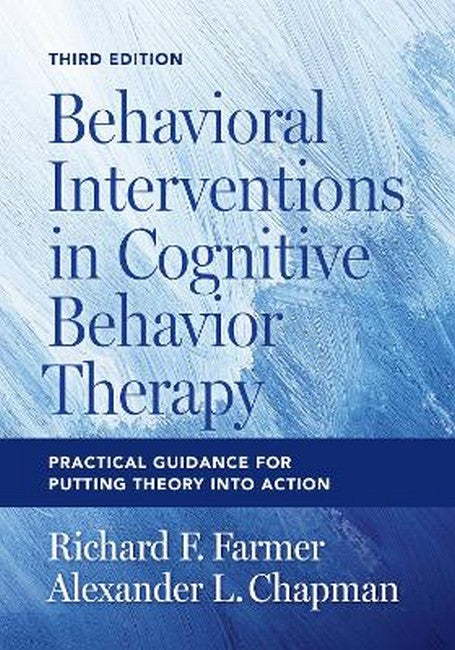Richard F. Farmer is a licensed psychologist and research scientist affiliated with Oregon Research Institute in Springfield, Oregon. After earning a doctoral degree in clinical psychology from the University of North Carolina at Greensboro following an internship at Duke University Medical Center, he served as an associate professor of psychology at Idaho State University and East Carolina University, and as a senior lecturer in psychology at the University of Canterbury in Christchurch, New Zealand. His main areas of research and clinical interest include behavioral assessment and therapy, emotional and behavioral disorders over the lifespan, personality disorders, impulsivity, and substance misuse. Alexander L. Chapman is a professor, registered psychologist, and director of clinical training in the Department of Psychology at Simon Fraser University as well as the president of the Dialectical Behaviour Therapy Centre of Vancouver. He received his BA from the University of British Columbia and his MS and PhD in clinical psychology from Idaho State University following an internship at Duke University Medical Center. Dr. Chapman completed a post-doctoral fellowship with Dr. Marsha Linehan at the University of Washington. Dr. Chapman's research focuses on complex mental health concerns such as borderline personality disorder.
Request Academic Copy
Please copy the ISBN for submitting review copy form
Description
Preface to the Third Edition Chapter 1. Historical and Conceptual Overview of Behavior and Cognitive Therapies Part I. Conceptual Foundations of Behavioral Assessment Chapter 2. Principles, Goals, and Structure of Initial Assessment Sessions Chapter 3. Behavioral Case Formulation Chapter 4. Treatment Planning and Implementation Part II. Interventions with Broad Applicability Chapter 5. Changing Behavior by Changing the Environment Chapter 6. Altering the Context that Supports Maladaptive Thinking Chapter 7. Developing and Strengthening New Behaviors and Skills Chapter 8. Reducing Distress and Avoidance Through Exposure-Based Interventions Part III. Interventions for Promoting Change in Specific Areas Chapter 9. Fostering Mindfulness and Acceptance Chapter 10. Enhancing Emotion Regulation Chapter 11. Promoting Behavioral Activation Chapter 12. Improving Problem Solving Chapter 13. Increasing Interpersonal Effectiveness Chapter 14. Strengthening Self-Management Skills Part IV. Therapy Process and Practice Considerations Chapter 15. Guiding Ethical and Professional Considerations When Using Behavioral Interventions Chapter 16. Navigating Therapeutic Challenges Chapter 17. Bringing Therapy to a Close and Aftercare References

